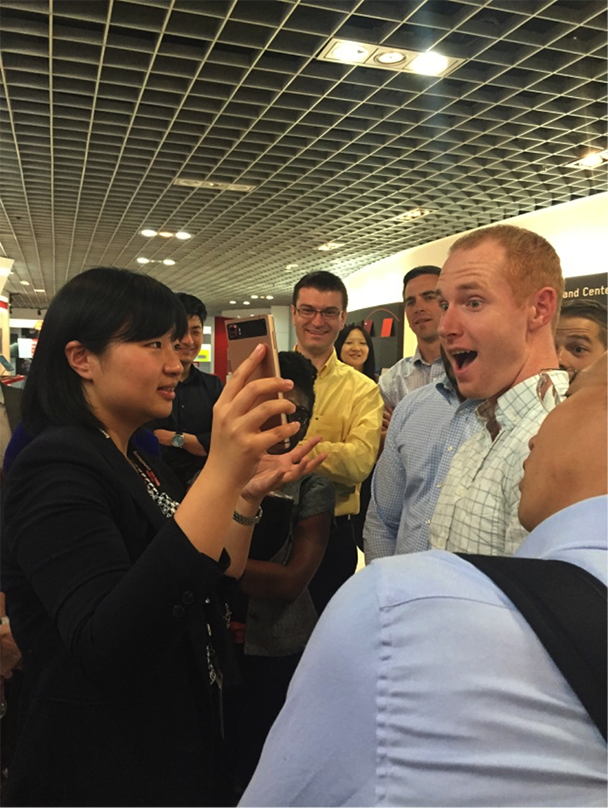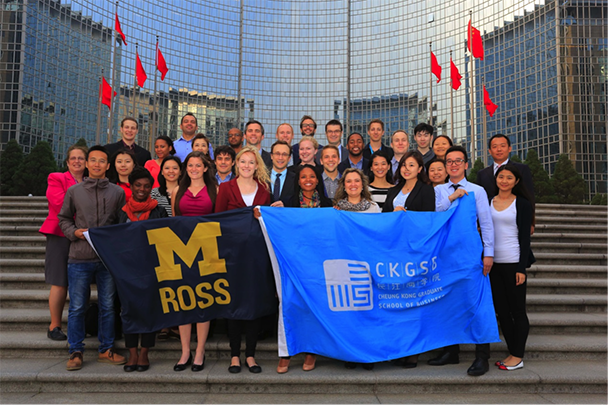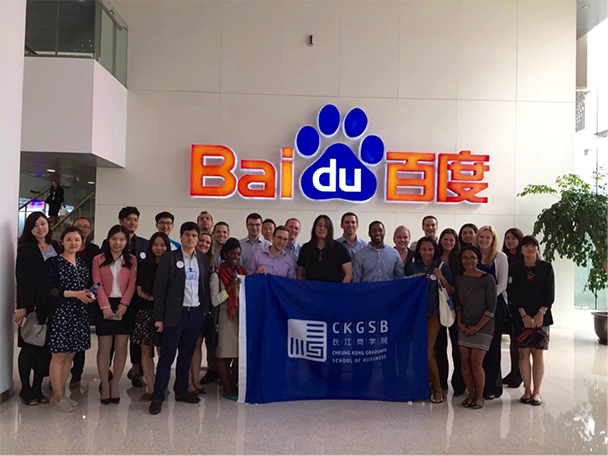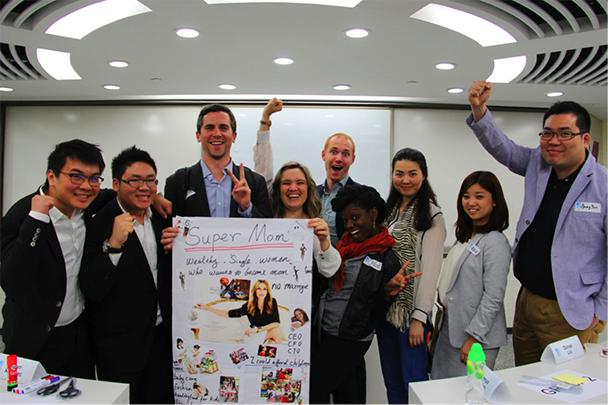Business school students who haven’t been to China may imagine a bucolic, provincial place, a slow-moving commerce environment and unsophisticated financial system. However, last month a group of students from the US and Brazil experienced firsthand what China’s economy is truly like through CKGSB’s China Module, offered through the Beijing-based MBA program. From the ancient Forbidden City to the gleaming office towers of Oriental Plaza, which houses CKGSB’s headquarters, students gained under-the-hood knowledge about China’s economic and business landscape.
.png)
FDC students enjoying the “One Night in Beijing” cultural event
On May 2 2015, Vanessa Fernandes Farnes landed in Beijing for the first time. After flying for 20 hours from São Paulo, Vanessa was dazed and amazed by the urbanization of the city. “There’s wifi everywhere and it’s easy to access information. The streets are beautiful and lined with trees. This place has really surprised me!” She had never imagined that Beijing might be such a safe and orderly place.
Vanessa worked for Visa in Brazil, before enrolling in CKGSB’s China Module along with two other classmates from Brazil. “We often hear about China in Brazil. But here, I listened to the professors talk about China and now I can put what I’ve heard in the past into its true context. This is what was most attractive to me about the China Module.”
The China Module is an offering of the CKGSB MBA program to worldwide MBA students to gain immersive experience in China. The two-week program is made up of classes, company visits and social events. Courses cover topics such as politics, history, culture, the judicial system and social structure. From these components, students gain a foundational understanding of the current economic context in China.

Lenovo’s Han Wenkai demonstrates the “Age Guess”
app to the group during a company visit
Since 2014, the China Module has been hosting students from the University of Michigan’s Ross School of Business and from Brazil’s Fundação Dom Cabral (FDC). This year, three students from FDC combined with 14 from Ross to participate in the two-week program. During the course, students learned from CKGSB’s world-class professors about China’s business model, as well as the risks and opportunities in this fast-changing market space. Ricardo Salera de Carvalho from Brazil maintains, “I often hear about China as the second largest economy in the world. I really want to understand exactly what happened here.” As a Brazilian, Ricardo wanted to know how a fellow BRIC state had managed to accomplish so much in so little time.
Based on his learnings from the China Module, Ricardo came to the conclusion that the growth was based on heavy investment in developing infrastructure such as high-speed rail systems. During a lecture called “China’s Development & Global Economy” by Prof. Leslie Young, Ricardo learned about the Chinese government’s gargantuan investment in infrastructure construction. For example, China is ranked 2nd in the world in terms of the total length of its high-speed railways, with over 65,000 kilometers of completed track latticing the country, even reaching the less developed interior. “This infrastructure will help China’s long-term development,” asserted Ricardo, who said he hopes that the Chinese government and SOEs can consider coming to Brazil to contribute to Brazil’s own development.

Students from FDC and Ross pose outside CKGSB’s headquarters in Beijing
Many students who take the China Module are interested in opportunities to enter the China market or partner with Chinese companies. For that reason, they are especially keen to learn about special business issues and economic challenges. Patrick Camal, who worked for FedEx before business school, is interested in understanding the impact that the Chinese government has on corporations. In fact, many MNCs are limited by China’s unique business structure and he said understanding how this influence works would help him adapt to China’s business environment.
In order for students to get different perspectives, CKGSB also organized company vists to Baidu, Lenovo, COFCO and Coca-Cola. For a long time, “Made in China” meant “Poorly Made in China”, but after visiting these companies, many students saw how outdated this concept was. Glauco Campos, the CEO of a large energy conglomerate in Brazil, said that Lenovo is a popular brand in Brazil and that he was happy to visit the company’s headquarters. At Baidu, Glauco was impressed by the image recognition and search applications. One of their apps scans photos for articles of clothing and automatically identifies retailers who sell similar items. Glauco was similarly impressed by Tencent’s WeChat app, which he found to have more useful functionalities than WhatsApp, which the dominant chat app in Brazil. “China is not only participating in a global innovation race, but in many cases, China is influencing and leading the world”, Glauco remarked.

The China Module group posing with Baidu’s Communication Director, Kaiser Kuo
The China Module is a cross-cultural platform. Students from around the world congregate in one classroom and, through lectures and shared experiences, engage in intellectual and interactive analytical teamwork. For example, Prof. Shalom Saar, who was the founder of the Leadership Development Center at Harvard University, posed a tricky team assignment during the class: how to drop a raw egg from the ceiling to the floor without breaking its shell.

In Prof. Cho Dong-Sung’s class, teams work together
to identify future market segments
Mario Fani, an MBA student from Ross Business School, is a true citizen of the world. He was born in Albania, immigrated to the United States, and now works in Luxembourg. Mario hopes that there will be opportunities for him to come to China to work in the future, which is also why he elected to take the China Module. During the group discussions, Mario was delighted to find that there were no communication barriers between the him and the Chinese students. “The Chinese students at CKGSB are very open-minded and their communication style is international.” During the China Module, there are also extracurricular components, such as hospice visits and cultural cooking lessons, which Mario also enjoyed. “China will have many more development opportunities. Through this process, every Chinese person will have the opportunity to change their destiny”.